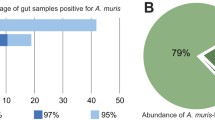Abstract
Sequencing microbiome samples has recently become a fast and cost-effective method to taxonomically profile communities. The growing interest in analyzing microbial sequencing data has attracted many new researchers to the field. Here, we present a straightforward bioinformatic pipeline that aims to streamline the processing of 16S rRNA sequencing data. This workflow is part of the larger project called Microbiome Helper (Comeau et al. mSyst 2:e00127-16, 2017), which includes other bioinformatic workflows, tutorials, and scripts available here: https://github.com/mlangill/microbiome_helper/wiki.
Access this chapter
Tax calculation will be finalised at checkout
Purchases are for personal use only
Similar content being viewed by others
References
Stackebrandt E, Goebel BM (1994) Taxonomic note: a place for DNA-DNA Reassociation and 16S rRNA sequence analysis in the present species definition in bacteriology. Int J Syst Bacteriol 44:846–849
Schloss PD, Westcott SL, Ryabin T et al (2009) Introducing mothur: open-source, platform-independent, community-supported software for describing and comparing microbial communities. Appl Environ Microbiol 75:7537–7541
Caporaso JG, Kuczynski J, Stombaugh J et al (2010) QIIME allows analysis of high-throughput community sequencing data. Nat Publ Gr 7:335–336
Comeau AM, Douglas GM, Langille MGI (2017) Microbiome Helper: a Custom and Streamlined Workflow for Microbiome Research. mSyst 2:e00127-16
Tange O (2011) GNU Parallel: the command-line power tool. Login USENIX Mag 36:42–47
Cole JR, Wang Q, Fish JA et al (2014) Ribosomal database project: data and tools for high throughput rRNA analysis. Nucleic Acids Res 42:633–642
DeSantis TZ, Hugenholtz P, Larsen N et al (2006) Greengenes, a chimera-checked 16S rRNA gene database and workbench compatible with ARB. Appl Environ Microbiol 72:5069–5072
Zhang J, Kobert K, Flouri T, Stamatakis A (2014) PEAR: a fast and accurate Illumina paired-end reAd mergeR. Bioinformatics 30:614–620
Rognes T, Flouri T, Nichols B et al (2016) VSEARCH: a versatile open source tool for metagenomics. PeerJ 4:e2584
Edgar RC (2010) Search and clustering orders of magnitude faster than BLAST. Bioinformatics 26:2460–2461
Edgar RC, Haas BJ, Clemente JC et al (2011) UCHIME improves sensitivity and speed of chimera detection. Bioinformatics 27:2194–2200
Rideout JR, He Y, Navas-Molina JA et al (2014) Subsampled open-reference clustering creates consistent, comprehensive OTU definitions and scales to billions of sequences. PeerJ 2:e545
Kopylova E, Noé L, Touzet H (2012) SortMeRNA: fast and accurate filtering of ribosomal RNAs in metatranscriptomic data. Bioinformatics 28:3211–3217
Lozupone C, Knight R (2005) UniFrac: a new phylogenetic method for comparing microbial communities. Appl Environ Microbiol 71:8228–8235
Vázquez-Baeza Y, Pirrung M, Gonzalez A, Knight R (2013) EMPeror: a tool for visualizing high-throughput microbial community data. Gigascience 2:16
Parks DH, Tyson GW, Hugenholtz P, Beiko RG (2014) STAMP: statistical analysis of taxonomic and functional profiles. Bioinformatics 30:3123–3124
Quast C, Pruesse E, Yilmaz P et al (2013) The SILVA ribosomal RNA gene database project: improved data processing and web-based tools. Nucleic Acids Res 41:590–596
Guillou L, Bachar D, Audic S et al (2013) The protist ribosomal reference database (PR2): a catalog of unicellular eukaryote small sub-unit rRNA sequences with curated taxonomy. Nucleic Acids Res 41:597–604
Koljalg U, Nilsson RH, Abarenkov K et al (2014) Towards a unified paradigm for sequence-based identification of fungi. Mol Ecol 22:5271–5277
Author information
Authors and Affiliations
Corresponding author
Editor information
Editors and Affiliations
Rights and permissions
Copyright information
© 2018 Springer Science+Business Media, LLC, part of Springer Nature
About this protocol
Cite this protocol
Douglas, G.M., Comeau, A.M., Langille, M.G.I. (2018). Processing a 16S rRNA Sequencing Dataset with the Microbiome Helper Workflow. In: Beiko, R., Hsiao, W., Parkinson, J. (eds) Microbiome Analysis. Methods in Molecular Biology, vol 1849. Humana Press, New York, NY. https://doi.org/10.1007/978-1-4939-8728-3_9
Download citation
DOI: https://doi.org/10.1007/978-1-4939-8728-3_9
Published:
Publisher Name: Humana Press, New York, NY
Print ISBN: 978-1-4939-8726-9
Online ISBN: 978-1-4939-8728-3
eBook Packages: Springer Protocols




